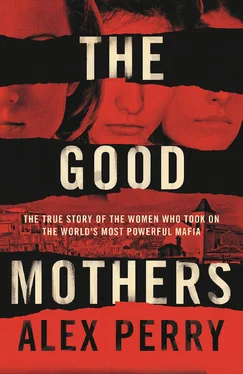In time, the provinces south of Rome had come to be known as the Mezzogiorno , the land where the midday sun blazed overhead, a dry, torpid expanse of peasant farmers and small-boat fishermen stretching from Abruzzo through Naples to the island of Lampedusa, 110 kilometres from North Africa. For much of the south, such a sweeping description was a clumsy stereotype. But for Calabria, the toe, it was accurate. The Romans had called it Bruttium and for 300 kilometres from north to south, Calabria was little more than thorn-bush scrub and bare rock mountains interspersed with groves of gnarled olives and fields of fine grey dust. It was eerily empty: more than a century of emigration had ensured there were four times as many Calabrians and their descendants outside Italy as in their homeland. When she was driven out of Reggio and into the countryside, Alessandra passed a succession of empty towns, deserted villages and abandoned farms. It felt like the aftermath of a giant disaster – which, if you considered the centuries of grinding destitution, it was.
Still, there was a hard beauty to the place. High up in the mountains, wolves and wild boar roamed forests of beech, cedar and holly oak. Below the peaks, deep cracks in the rock opened up into precipitous ravines through which ice-cold rivers raged towards the sea. As the incline eased, woods gave way to vines and summer pastures, followed by estuary flats filled with lemon and orange orchards. In summer, the sun would scorch the earth, turning the soil to powder and the prickly thorn-grass to roasted gold. In winter, snow would cover the mountains and storms would batter the cliffs on the coast and drag away the beaches.
Alessandra wondered whether it was the violence of their land that bred such ferocity in Calabrians. They lived in ancient towns built on natural rock fortresses. In their fields, they grew burning chilli and intoxicating jasmine and raised big-horned cows and mountain goats which they roasted whole over hearths stoked with knotted vine wood. The men hunted boar with shotguns and swordfish with harpoons. The women spiced sardines with hot peppers and dried trout in the wind for months before turning the meat into a pungent brown stew. For Calabrians, there was also little divide between the holy and the profane. On saints’ days, morning processions would be followed by afternoon street feasts at which the women would serve giant plates of maccheroni with ’nduja , a hot, soft pepper sausage the colour of ground brick, washed down with a black wine that stained the lips and seared the throat. As the sun began to sink, the men would dance the Tarantella , named after the effects of the poisonous bite of the wolf spider. To the tune of a mandolin, the beat of a goatskin tambourine and a song about thwarted love or a mother’s love or the thrill of a hot spurt of blood from a stabbed traitor’s heart, the men would compete for hours to see who could dance fastest and longest. ‘The Greece of Italy’, wrote the newspapers, though in reality that was an insult to Greece. Unlike its Ionian neighbour, southern Italy’s legal economy hadn’t grown since the millennium. Unemployment among the young, at more than one in two, was among the worst in Europe.
The south had experienced one kind of development, however. Many southerners saw Garibaldi’s creation of a northern-dominated Italian state as an act of colonisation. Already damned for who they were, they cared little for northern opinions of what they did. Across the Mezzogiorno , from the birth of the Republic, brigands were commonplace. Some organised themselves into family groups. In the century and a half since unification, a few hundred families in Naples, Sicily and Calabria had grown rich. And as criminal rebels who claimed to be secretly subverting an occupying state, they used the intimacy and loyalty of family and a violent code of honour and righteous resistance to draw a veil of omertà over their wealth. Even in 2009, Calabria’s crime bosses still dressed like orange farmers. It was only in the last few years that the Italian government had begun to grasp that these brutish men, with their bird-faced women and tearaway sons, were among the world’s great criminal masterminds.
There was, at least, no mystery to who ran the ’Ndrangheta. The south’s lack of progress was social as much as material. Tradition held that each family was a miniature feudal kingdom in which men and boys reigned supreme. The men granted their women little authority or independence, nor even much of a life beyond an existence as vassals of family property and honour. Like medieval kings, fathers paired their girls off as teenagers to seal clan alliances. Beatings of daughters and wives were routine. To men, women were desirable but feckless, not to be trusted to stay faithful or direct their own lives but to be kept strictly in line for their own good. Women who were untrue, even to the memory of a husband dead for fifteen years, were killed, and it would be their fathers, brothers, sons and husbands who did it. Only blood could wash clean the family honour, the men would say. Often they burned the bodies or dissolved them in acid to be sure of erasing the family shame.
Such a perversion of family would have been extraordinary in any time or place. It was especially so in Italy, where family was close to sacred. 4The severity of the misogyny prompted some prosecutors to compare the ’Ndrangheta with Islamist militants. Like ISIS or Boko Haram, ’Ndranghetisti routinely terrorised their women and slaughtered their enemies in the service of an immutable code of honour and righteousness.
So, yes, Calabria’s prosecutors would say, the life of an ’Ndrangheta woman like Lea Garofalo was tragic. And, yes, the ’Ndrangheta’s inhuman sexism was one more reason to destroy it. But that didn’t mean the women were much use in that fight. Almost from the day in April 2009 that Alessandra arrived from Milan, many of her colleagues told her the women in the mafia were just more of its victims. ‘The women don’t matter,’ they said. 5When they heard of Lea’s disappearance, they conceded the news was heartbreaking, especially for those who had known Lea and Denise in witness protection. But Lea’s death was merely a symptom of the problem, they insisted. It had no bearing on the cause.
Alessandra disagreed. She claimed no special insight into family dynamics. Alessandra was forty-one, married without children, and her appearance – slim, meticulously dressed, with short straight hair in a sharp, boyish parting – emphasised cool professionalism. When it came to The Family, however, Alessandra argued that it was only logical that women would have a substantial role in a criminal organisation structured around kin. Family was the lifeblood of the mafia. Like an unseen, uncut umbilical cord, family was how the mafia delivered nourishing, fortifying power to itself. And at the heart of any family was a mother. Besides, argued Alessandra, if the women really didn’t matter, why would the men risk it all to kill them? The women had to be more than mere victims. As a Sicilian and a woman inside the Italian judiciary, Alessandra also knew something about patriarchies that belittled women even as they relied on them. Most judicial officials missed the importance of ’Ndrangheta women, she said, because most of them were men. ‘And Italian men underestimate all women,’ she said. ‘It’s a real problem.’
At the time Lea Garofalo went missing, evidence to support Alessandra’s views was on display in every Italian newspaper. For two years, the press had filled its pages with the lurid allegations and distinctly conservative attitudes of a state prosecutor in Perugia called Giuliano Mignini. Mignini had accused an American student, Amanda Knox – with the assistance of two men, one of whom was Knox’s boyfriend of five days – of murdering her British flatmate, Meredith Kercher. Mignini alleged the two men were in thrall to Knox’s satanic allure. Taking his lead from Mignini, a lawyer in the case described Knox as a ‘she-devil … Lucifer-like, demonic … given over to lust’. Fifty-nine years old, a devout Catholic and father of four daughters, Mignini later told a documentary maker that though the forensic evidence against Knox was scant, her ‘uninhibited’ character and ‘lack of morals’ had convinced him. ‘She would bring boys home,’ he mused. ‘Pleasure at any cost. This is at the heart of most crime.’ 6
Читать дальше












